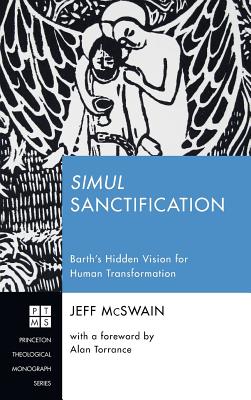Why do we see so much fruitful good in unbelievers and so much evil in believers? What could it mean for a believer that the old is ""gone,"" especially when it doesn’t feel that way? What does it mean for humans who are simul iustus et peccator (simultaneously righteous and sinner) to be transformed in Christ and by his Spirit? We typically think of sanctification as pertaining to humans being conformed to Jesus, but what could it mean when Jesus speaks of himself as being sanctified for our sakes (John 17:19)? Jeff McSwain mines the theology of Karl Barth to engage such questions. In looking ""through the simul,"" he concludes with Barth that universal human transformation is a reality before it is a possibility, and that, despite our contradictory state, we may live Spirit-filled lives as we participate in Christ’s true humanity that determines ours--a humanity which never gets old. ""In an original contribution, McSwain succeeds in demonstrating how Barth’s version of the Lutheran ’simul iustus et peccator’ is radicalized by its extension to the incarnate Son and thereby to the race as a whole, transferring the pattern of Chalcedonian Christology (the so-called ’two natures’ doctrine) into the field of anthropology. The result is a significant recasting of our ways of thinking about numerous core doctrines, including creation, atonement and incarnation as well as redemption and fall."" --Trevor Hart, author of Regarding Karl Barth ""I have literally been waiting for years for this book--a book that explores in depth what the sanctification of Jesus Christ means for the sanctification of humanity. In this excellent, accessible, and innovative work, Jeff McSwain carefully examines how Karl Barth reappropriates the classic doctrine simul iustus et peccator while also creatively imagining ways Barth’s understanding could enliven the life and ministry of the church today. This is a beautiful contribution to the growing theological literature on sanctification and discipleship."" --Kristen Deede Johnson, award winning author of The Justice Calling ""McSwain argues persuasively that the simul . . . is a powerful key to Barth’s theology as a whole. Breaking new ground, yet firmly committed to all the key truths championed by Barth, McSwain’s theological insightfulness is evident on every page. An impressively comprehensive knowledge of Barth’s Dogmatics is also on display, along with a truly Barthian passion for the truth and the importance of the gospel . . . McSwain’s thesis is both fascinating and challenging. It will richly reward careful engagement."" --Douglas Campbell, Duke University ""There’s a remarkable single-mindedness about Jeff McSwain, a theological determination that yields insights impossible to ignore. Here he presses us to read Barth’s doctrine of sanctification through Luther’s simul iustus et peccator, and in the process uncovers a wealth of connections and resonances with immense practical consequences for the life of the church. Provocative and game-changing, Barth--and the gospel!--will never sound quite the same again."" --Jeremy Begbie, Duke University ""Birthed in the fires of real world missional controversy, this book crackles with the urgency of the gospel. Drawing from the deep well of Barth’s Church Dogmatics, Jeff McSwain offers a refreshing vision of Christian life freed to live wholly in this world by seeking the true life hidden in Christ."" --Brian Brock, University of Aberdeen ""McSwain casts his net wide, but discerningly, fastidiously mirroring Barth’s understanding of tradition and the Bible. Simul Sanctification: Jesus Christ incarnate is at once the Righteous One of God, and the One who assumes sinful human flesh. With echoes of Gregory, what McSwain calls ’Chalcedonian anthropology’ adds to the corpus of Barthian studies and provides enhanced perspective on Barth’s theological actualism: the sanctified life of a singular Jewish human of humble origins who re-presents in every hum
| FindBook |
有 1 項符合
Simul Sanctification: Barth’s Hidden Vision for Human Transformation的圖書 |
 |
Simul Sanctification: Barth’s Hidden Vision for Human Transformation 作者:Mcswain 出版社:Pickwick Publications 出版日期:2018-08-10 語言:英文 規格:精裝 / 334頁 / 22.9 x 15.2 x 2 cm / 普通級 |
| 圖書館借閱 |
| 國家圖書館 | 全國圖書書目資訊網 | 國立公共資訊圖書館 | 電子書服務平台 | MetaCat 跨館整合查詢 |
| 臺北市立圖書館 | 新北市立圖書館 | 基隆市公共圖書館 | 桃園市立圖書館 | 新竹縣公共圖書館 |
| 苗栗縣立圖書館 | 臺中市立圖書館 | 彰化縣公共圖書館 | 南投縣文化局 | 雲林縣公共圖書館 |
| 嘉義縣圖書館 | 臺南市立圖書館 | 高雄市立圖書館 | 屏東縣公共圖書館 | 宜蘭縣公共圖書館 |
| 花蓮縣文化局 | 臺東縣文化處 |
|
|
圖書介紹 - 資料來源:博客來 評分:
圖書名稱:Simul Sanctification: Barth’s Hidden Vision for Human Transformation
內容簡介
作者簡介
Dr. Jeff McSwain (BA, Davidson College; MLitt with distinction, University of St. Andrews, Scotland; PhD, University of St. Andrews, Scotland) is the founder of Reality Ministries Inc. in Durham, North Carolina, where he is currently Director of Ministry Formation and Theologian in Residence. Reality Ministries is "creating opportunities for teens and adults with and without developmental disabilities to experience belonging, kinship, and the life-changing Reality of Christ’s love."
|











